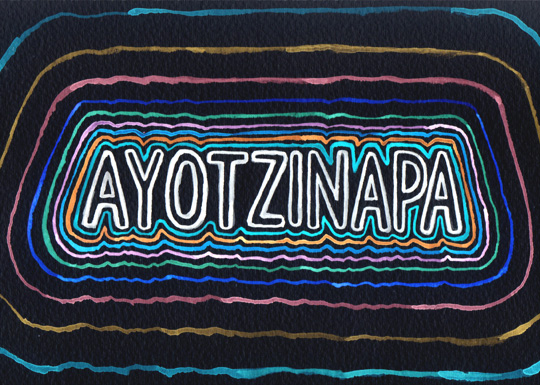David Huerta wrote “Ayotzinapa” on November 2, 2014, “in anger, outrage, and horror.” It has already formed an installation at the Oaxaca Museum of Contemporary Art, been printed by Juan Nicanor Pascoe’s letterpress, and been read and excerpted in protest banners from Berlin to Xalapa. When I read it two weeks ago, I realised there was a very practical way for Asymptote, as a journal of international literature, to communicate Mexico’s rallying cry for change and justice in multiple languages. Juana Adcock’s English translation was the first in a chain that now stretches from Mexico to Scotland, China, Romania, Israel, Indonesia, Brazil, Greece, and beyond. Asymptote’s global “Ayotzinapa” has become a poetic event, an audible coming-together, which is one constructive way of responsibly renewing the word Ayotzinapa, as Valeria Luiselli suggests we must do in her introduction to the poem. All of the translations begin with the same, untouched word, Ayotzinapa; like David, all of our translators took pains to get across—rephrasing the Greek poet C. P. Cavafy—what these Ayotzinapas mean.
Below you can read and listen to David Huerta’s original Spanish-language poem. You can also use the drop-down menu like a map to read translations of his poem in 20 languages. Listen, too, to our translators’ audio recordings, and particularly to their pronunciation of the unchanged title, “Ayotzinapa.” Above all, this global translation is about resisting the state of speechlessness that is easy to fall into when what you are witnessing is beyond imagination; about learning how to say Ayotzinapa; about stopping the word Ayotzinapa from being a strange, unrelated Mexican sound. #WeAreAllAyotzinapa #WritersWithAyotzinapa — Sophie Hughes, Editor-at-large, Mexico

